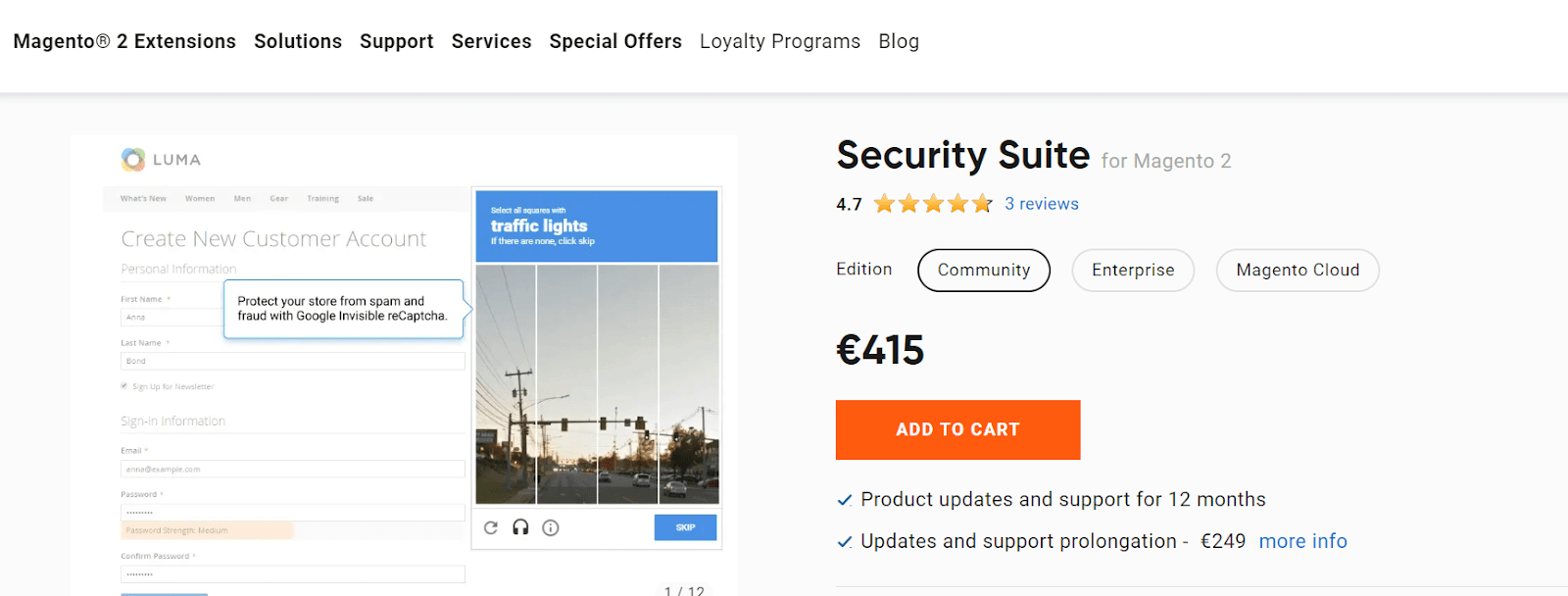eCommerce website security is all about taking care of your business and customers. Learn how to protect your Magento store.
Any eCommerce platform can be hacked and your business’ and customers’ private data, including personal details and payment information, can be stolen.
For example, in a payment skimmer attack that took place in 2020, more than 500 Magento sites were compromised. Subsequently, in 2022, an alarming increase in cyber attacks was witnessed, specifically targeting Adobe and Magento stores. These attacks exploited a critical mail template vulnerability known as CVE-2022-24086.
So, even though Magento is considered one of the most secure and stable platforms, it does not mean that it can’t be hacked. It is always a wise decision to take care of eCommerce security and learn how to prevent your store from cyber attacks.
This is why we created this article for you! Let’s dive into Magento security features and best practices, as well as extensions that can make your store bulletproof.
Features for Securing Magento
#1 AES-256 Algorithm for Data Encryption
The AES-256 algorithm, included into Magento is considered one of the strongest encryption standards available today that helps Magento stores protect sensitive data, such as credit card details and passwords for payment and shipping modules. AES-256 employs multiple rounds of substitution, permutation, and mixing operations to ensure the confidentiality and integrity of the encrypted data. This algorithm utilizes an encryption key which “salts” all sensitive data to ensure its undecryptability.
The encryption key can be changed whenever necessary. But we strongly recommend you to regularly do it to enhance security, as the original key could become vulnerable at any point. When the key is updated, all existing data is re-encrypted using the new key.
#2 Admin Login Attempts Limit
To enhance the security of your admin panel and safeguard it against potential attackers, Magento allows users to impose limitations on failed login attempts. By restricting the number of unsuccessful login tries, you can mitigate the risk of brute-force attacks. Additionally, it is advisable to impose restrictions on the maximum number of password reset requests to prevent unauthorized access attempts.
#3 Protection from Cookie Theft
Magento has a new type of secure cookie that is transmitted over an encrypted HTTP connection. The secure attribute ensures that the browser only returns the cookie to the application over the encrypted connection.
#4 Activation of Session Validation Variables
Magento 2 has a built-in security feature that safeguards against potential session attacks or unauthorized attempts to take over user sessions. This protective measure in Magento 2 focuses on checking and confirming the validity of session variables each time someone visits an online store. It pays special attention to the session ID, which is a unique identifier for each user’s session. By doing this, the system verifies the authenticity of visitors by comparing the session data stored on the server with the validation variables.
If the expected information is not transmitted as anticipated, or if a key piece of information is missing, the validation process fails. In such cases, the corresponding session variable is left empty, and as a result, the user’s session is immediately terminated to prevent any potential threats.
#5 Two-Factor Authentication
Magento enables two-factor authentication (2FA) to add an extra layer of security to your Magento admin accounts, which is a must-have feature for any eCommerce platform.
When 2FA is on, users are typically required to provide their regular login credentials (username and password) as the first factor. The second factor is usually a unique, time-based, or one-time password (OTP) that is generated through a mobile app, email, or SMS. This OTP serves as a temporary and dynamic code that must be entered by the user to complete the authentication process.
#6 Powerful Content Security Policies
Magento has content security policies (CSP) that act as guards for websites, stopping attacks like stealing info or tricking you into clicking malicious things. CSP protects your site from injecting malicious scripts into the webpages. CSP approach notifies the browser about what scripts are allowed to load on the website, so the browser prevents injecting any other scripts, which could’ve been potentially injected by xss attack and do any malicious staff like:
- running bad code from a hacker’s site.
- stealing your credit card details or login details and sending them to a hacker.
- making you click something you didn’t mean to by using sneaky styles.
#7 Prevention of XSS Vulnerability
To ensure the security of your Magento website, it is crucial to implement verification and clean-up measures for both user input and output.
Attackers can manipulate any data sent to a website, adding harmful symbols, fake IDs, or tampered cookies. Both Magento Open Source and Adobe Commerce have a bunch of tools which allow developers filter and clean up any inputs and escape any output before displaying data from outside sources. This helps prevent attacks like cross-site scripting (XSS).
#8 CSRF Attack Prevention
CSRF is an attack that tricks your web browser into doing things on a website without you knowing. To prevent this, Magento uses CSRF tokens, which are generated as secret codes and added to forms on the server side. The website checks these codes when you submit a form to make sure that the data has been sent exactly from that particular form and not from the hacker’s computer
#9 Ability to Change URLs for Admin Panel
To safeguard the admin panel, store owners should begin by altering the default access URL. Typically, the default admin URL is structured as your-website.com/admin or in case of some specific systems – your-website/wp-admin. Since the store’s domain is public, cybercriminals can easily guess this URL.
Modifying the default admin URL strengthens Magento’s security by making it necessary for malicious actors to determine the correct URL before attempting any hacking, such as launching a brute force cyber-attack. In case of Magento 2 you can not only change the default admin url but even move your admin to a separate subdomain or even domain. Which makes “guessing” your admin url a really challenging task.
Magento 2 Security Extension
To enhance security measures for Magento websites and protect your store from cyber attacks, you can draw benefits from multiple extensions available. We picked 3 our favorite ones and now offer you to check if they will work for your business.
MegaPlaza Magento 2 Security Extension

Mageplaza Security extension for Magento 2 is a robust security solution that empowers online merchants to protect their stores from potential threats.
With its advanced firewall, malware scanning, 2FA, IP whitelisting and blacklisting, security audit, and web application firewall features, this extension offers a comprehensive set of tools to ensure the security of your Magento 2-based online store.
Price: $99
Amasty’s Security Suite

Security Suite for Magento 2 by Amasty prioritizes the security of your online store or marketplace. With its intelligent firewall, malware and virus scanning, two-factor authentication, admin login restrictions, security audit, and emergency access features, this comprehensive solution empowers merchants to protect their Magento 2 stores from potential threats.
Price:€415
Astra

Astra has a unique ability to detect logic errors that are frequently overlooked by automated tools. The product offers a range of features, including a robust Web Application Firewall (WAF) that effectively prevents malware injections, XSS attacks, and defends against bad bots while ensuring that fake users are unable to sign up on your website.
This extension is optimized specifically for Magento, automatically patching vulnerabilities, blocking malicious users attempting to gain administrative access, and securing third-party plugins, resulting in comprehensive protection for your online store.
Price: $12-$149 per month.
Magento 2 Security Best Practices
When dealing with security, the site owner needs to understand that it is not only about proper configuration or setting up some additional extensions. It is a permanent process which includes regular monitoring and health checks of your website. Follow best practices mentioned below to protect your website from potential vulnerabilities and threats.
#1 Use Magento Security Scanner
Magento Security Scan is a free tool that helps you identify potential security vulnerabilities in your Magento installation by scanning your site for known security risks. The tool checks for issues such as outdated software, weak passwords, known malware signatures, and unauthorized access.
#2 Install Magento Security Patches
Magento periodically releases security patches to ensure the ongoing security and integrity of the platform. These patches address vulnerabilities found in the core Magento codebase, as well as in various extensions and modules that are commonly used in Magento installations. They may include code modifications, bug fixes, or configuration changes that mitigate the identified security risks.
#3 Do Regular Magento Security Checks
In addition to applying security patches, it’s important to conduct regular security checks on your Magento website. This involves reviewing the configuration settings, checking file and directory permissions, and examining logs for any suspicious activities. You can also perform vulnerability assessments and penetration testing to identify and address potential security threats.
Adobe Security Checklist
Adobe shares its own recommendations to help developers and business owners ensure the security of their Magento-powered eCommerce stores. The checklist aims to mitigate potential security risks and vulnerabilities that could compromise the integrity, confidentiality, and availability of online stores.
The recommendations cover main security measures, such as running AEM in production-ready mode, enabling HTTPS for transport layer security, installing security hotfixes, changing default passwords, implementing custom error handling, completing dispatcher security checklist, etc. Here at Magecom, we follow all the instructions by Adobe to ensure the top level of safety for our clients.
Burp Suite for Security Checks
To make thorough security checks here at Magecom, we use Burp Suite, a powerful cybersecurity tool designed to help identify and address potential vulnerabilities in online stores.
Burp Suite consists of several integrated modules that work together to provide a complete set of tools for security testing, namely:
- Scanner module checks websites for SQL injection, cross-site scripting (XSS), and more. It identifies potential vulnerabilities and provides detailed reports.
- Proxy module allows users to intercept and modify the traffic between a web browser and the target online store for analyzing and manipulating requests and responses.
- Spider module navigates through an online store, discovering and mapping out different pages and functionality. It helps create a comprehensive view of the website structure.
- Intruder module automates and streamlines the process of testing for different types of vulnerabilities by sending multiple payloads and analyzing responses. It’s particularly useful for brute-force attacks.
- Repeater module enables developers to manually modify and send HTTP requests to the target site to test specific vulnerabilities in different scenarios.
- Decoder/Encoder assists in, obviously, decoding and encoding different data formats for analyzing how input is processed by the store and identifying vulnerabilities.
- Comparer: The comparer module helps analyze and compare different HTTP requests and responses, allowing users to spot differences that might indicate security issues.
Burp Suite is a vital tool in the arsenal of our development team for ensuring cybersecurity and preventing potential breaches or attacks.
Conclusion:
How to Achieve Top eCommerce Site Security Emphasizing the significance of your online store’s security is crucial. And we are here to help! If you are seeking to fortify your online store’s security or if you’re unsure about its current level of protection, you can ask our dedicated team to conduct a security audit of your site and establish robust security measures. Take the first step by sharing your contact information with us through this form.
Safeguarding your online presence is our priority, and we look forward to helping you achieve peace of mind in digital commerce.




